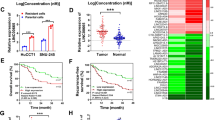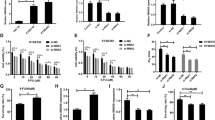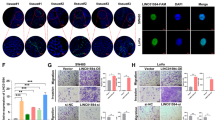Abstract
Esophageal cancer (EC) is a serious digestive malignancy which remains the sixth leading cause of cancer-related deaths worldwide. Emerging evidence suggests the involvement of long non-coding RNAs (lncRNAs) in the tumorigenesis of EC and thus, in this study we explored the potential effects of lncRNA LINC01270 on EC cell proliferation, migration, invasion and, drug resistance via regulation of glutathione S-transferase P1 (GSTP1) methylation. First, we screened out the EC-related differentially expressed lncRNAs, and the expression of our top candidate LINC01270 was quantified in EC tissues and cells. To define the role of LINC01270 in EC progression, we evaluated the proliferation, migration and invasion of EC cells when the LINC01270 was overexpressed or knocked down, in the presence of the GSTP1 methylation inhibitor SGI-1027 and 5-fluorouracil (5-FU). In addition, interaction between LINC01270 and methylation of the GSTP1 promoter was identified. Finally, we assessed transplantable tumor growth in nude mice. LINC01270 was up-regulated and GSTP1 was down-regulated in EC tissues and cells. Silencing of LINC01270 inhibited migration and invasion, and enhanced the sensitivity of 5-FU in EC cells. We found that LINC01270 recruited the DNA methyltransferases DNMT1, DNMT3A and DNMT3B initiating GSTP1 promoter methylation, thereby leading to the proliferation, migration, invasion and drug resistance of EC cells. Moreover, GSTP1 overexpression was observed to reverse the effects of LINC01270 overexpression on EC cells and their response to 5-FU. Taken together, this study shows that inhibition of LINC01270 can lead to suppression of EC progression via demethylation of GSTP1, highlighting this lncRNA as a potential target for EC treatment.
This is a preview of subscription content, access via your institution
Access options
Subscribe to this journal
Receive 12 print issues and online access
$259.00 per year
only $21.58 per issue
Buy this article
- Purchase on Springer Link
- Instant access to full article PDF
Prices may be subject to local taxes which are calculated during checkout






Similar content being viewed by others
Change history
11 March 2022
A Correction to this paper has been published: https://doi.org/10.1038/s41417-022-00439-4
References
Malhotra GK, Yanala U, Ravipati A, Follet M, Vijayakumar M, Are C. Global trends in esophageal cancer. J Surg Oncol. 2017;115:564–579.
Domper Arnal MJ, Ferrandez Arenas A, Lanas Arbeloa A. Esophageal cancer: Risk factors, screening and endoscopic treatment in Western and Eastern countries. World J Gastroenterol. 2015;21:7933–7943.
Kidane B, Coughlin S, Vogt K, Malthaner R. Preoperative chemotherapy for resectable thoracic esophageal cancer. Cochrane Database Syst Rev. 2015. https://doi.org/10.1002/14651858.CD001556.pub3CD001556.
Song S, Honjo S, Jin J, Chang SS, Scott AW, Chen Q, et al. The hippo coactivator YAP1 mediates EGFR overexpression and confers chemoresistance in esophageal cancer. Clin Cancer Res. 2015;21:2580–2590.
Ajani JA, Wang X, Song S, Suzuki A, Taketa T, Sudo K, et al. ALDH-1 expression levels predict response or resistance to preoperative chemoradiation in resectable esophageal cancer patients. Mol Oncol. 2014;8:142–149.
Shi X, Sun M, Liu H, Yao Y, Song Y. Long non-coding RNAs: a new frontier in the study of human diseases. Cancer Lett. 2013;339:159–166.
Gibb EA, Brown CJ, Lam WL. The functional role of long non-coding RNA in human carcinomas. Mol Cancer 2011;10:38.
Li JY, Ma X, Zhang CB. Overexpression of long non-coding RNA UCA1 predicts a poor prognosis in patients with esophageal squamous cell carcinoma. Int J Clin Exp Pathol. 2014;7:7938–7944.
Chen FJ, Sun M, Li SQ, Wu QQ, Ji L, Liu ZL, et al. Upregulation of the long non-coding RNA HOTAIR promotes esophageal squamous cell carcinoma metastasis and poor prognosis. Mol Carcinog. 2013;52:908–915.
Tong YS, Wang XW, Zhou XL, Liu ZH, Yang TX, Shi WH, Xie HW, Lv J, Wu QQ, Cao XF. Identification of the long non-coding RNA POU3F3 in plasma as a novel biomarker for diagnosis of esophageal squamous cell carcinoma. Mol Cancer 2015;14:3.
Su M, Xiao Y, Ma J, Cao D, Zhou Y, Wang H, et al. Long non-coding RNAs in esophageal cancer: molecular mechanisms, functions, and potential applications. J Hematol Oncol. 2018;11:118.
Wang YZ, An Y, Li BQ, Lu J, Guo JC. Research progress on circularRNAs in pancreatic cancer: emerging but promising. Cancer Biol Ther 2019;20:1163–1171.
Uchida Y, Chiyomaru T, Enokida H, Kawakami K, Tatarano S, Kawahara K, Nishiyama K, Seki N, Nakagawa M. MiR-133a induces apoptosis through direct regulation of GSTP1 in bladder cancer cell lines. Urol Oncol. 2013;31:115–123.
Sergentanis TN, Economopoulos KP. GSTT1 and GSTP1 polymorphisms and breast cancer risk: a meta-analysis. Breast Cancer Res Treat. 2010;121:195–202.
Liu WZ, Sun Y, Feng X, Bi XH, Liu T, Zhou HF. An updated meta-analysis for association of glutathione S-transferase P1 gene polymorphism with the susceptibility of lung cancer. J Cancer Res Ther. 2018;14:S1084–S1090.
Li QF, Yao RY, Liu KW, Lv HY, Jiang T, Liang J. Genetic polymorphism of GSTP1: prediction of clinical outcome to oxaliplatin/5-FU-based chemotherapy in advanced gastric cancer. J Korean Med Sci. 2010;25:846–852.
Xu Z, Zhu H, Luk JM, Wu D, Gu D, Gong W, et al. Clinical significance of SOD2 and GSTP1 gene polymorphisms in Chinese patients with gastric cancer. Cancer 2012;118:5489–5496.
Bhat A, Masood A, Wani KA, Bhat YA, Nissar B, Khan NS, et al. Promoter methylation and gene polymorphism are two independent events in regulation of GSTP1 gene expression. Tumour Biol. 2017;39:1010428317697563.
Li Y, Cai Y, Chen H, Mao L. Clinical significance and association of GSTP1 hypermethylation with hepatocellular carcinoma: a meta-analysis. J Cancer Res Ther. 2018;14:S486–S489.
Pandey M, Shukla S, Gupta S. Promoter demethylation and chromatin remodeling by green tea polyphenols leads to re-expression of GSTP1 in human prostate cancer cells. Int J Cancer 2010;126:2520–2533.
Li D, Dandara C, Parker MI. The 341C/T polymorphism in the GSTP1 gene is associated with increased risk of oesophageal cancer. BMC Genet. 2010;11:47.
Song Y, Du Y, Zhou Q, Ma J, Yu J, Tao X, et al. Association of GSTP1 Ile105Val polymorphism with risk of esophageal cancer: a meta-analysis of 21 case-control studies. Int J Clin Exp Med. 2014;7:3215–3224.
Emerson JJ, Li WH. The genetic basis of evolutionary change in gene expression levels. Philos Trans R Soc Lond B Biol Sci. 2010;365:2581–2590.
Robinson MD, McCarthy DJ, Smyth GK. edgeR: a bioconductor package for differential expression analysis of digital gene expression data. Bioinformatics 2010;26:139–140.
Luo HC, Lin GS, Cheng HH, Fu ZC. A preliminary study on the consistency between the non-surgical staging and the surgical-pathological staging in oesophageal carcinoma. Interact Cardiovasc Thorac Surg. 2012;15:344–347.
Lin MF, Jungreis I, Kellis M. PhyloCSF: a comparative genomics method to distinguish protein coding and non-coding regions. Bioinformatics. 2011;27:i275–i282.
Merry CR, Forrest ME, Sabers JN, Beard L, Gao XH, Hatzoglou M, et al. DNMT1-associated long non-coding RNAs regulate global gene expression and DNA methylation in colon cancer. Hum Mol Genet. 2015;24:6240–53.
D’Journo XB, Thomas PA. Current management of esophageal cancer. J Thorac Dis. 2014;6:S253–S264.
Jiao C, Song Z, Chen J, Zhong J, Cai W, Tian S, Chen S, Yi Y, Xiao Y. lncRNA-UCA1 enhances cell proliferation through functioning as a ceRNA of Sox4 in esophageal cancer. Oncol Rep. 2016;36:2960–2966.
Chen MJ, Deng J, Chen C, Hu W, Yuan YC, Xia ZK. LncRNA H19 promotes epithelial mesenchymal transition and metastasis of esophageal cancer via STAT3/EZH2 axis. Int J Biochem Cell Biol. 2019;113:27–36.
Pan Z, Mao W, Bao Y, Zhang M, Su X, Xu X. The long noncoding RNA CASC9 regulates migration and invasion in esophageal cancer. Cancer Med. 2016;5:2442–2447.
Li S, Xu Y, Sun Z, Feng L, Shang D, Zhang C, et al. Identification of a lncRNA involved functional module for esophageal cancer subtypes. Mol Biosyst. 2016;12:3312–3323.
Abraham JM, Meltzer SJ. Long noncoding RNAs in the pathogenesis of Barrett’s esophagus and esophageal carcinoma. Gastroenterology 2017;153:27–34.
Monnier P, Martinet C, Pontis J, Stancheva I, Ait-Si-Ali S, Dandolo L. H19 lncRNA controls gene expression of the Imprinted Gene Network by recruiting MBD1. Proc Natl Acad Sci USA. 2013;110:20693–20698.
Holoch D, Moazed D. RNA-mediated epigenetic regulation of gene expression. Nat Rev Genet 2015;16:71–84.
Zhu L, Xu PC. Downregulated LncRNA-ANCR promotes osteoblast differentiation by targeting EZH2 and regulating Runx2 expression. Biochem Biophys Res Commun. 2013;432:612–617.
Sun W, Yang Y, Xu C, Guo J. Regulatory mechanisms of long noncoding RNAs on gene expression in cancers. Cancer Genet. 2017;216-217:105–110.
Suzuki H, Maruyama R, Yamamoto E, Kai M. DNA methylation and microRNA dysregulation in cancer. Mol Oncol. 2012;6:567–78.
Bell A, Bell D, Weber RS, El-Naggar AK. CpG island methylation profiling in human salivary gland adenoid cystic carcinoma. Cancer 2011;117:2898–2909.
Cui X, Zhao Z, Liu D, Guo T, Li S, Hu J, et al. Inactivation of miR-34a by aberrant CpG methylation in Kazakh patients with esophageal carcinoma. J Exp Clin Cancer Res. 2014;33:20.
Zovoilis A, Agbemenyah HY, Agis-Balboa RC, Stilling RM, Edbauer D, Rao P, et al. microRNA-34c is a novel target to treat dementias. EMBO J. 2011;30:4299–4308.
Kaz AM, Grady WM. Epigenetic biomarkers in esophageal cancer. Cancer Lett. 2014;342:193–199.
Mutallip M, Nohata N, Hanazawa T, Kikkawa N, Horiguchi S, Fujimura L, et al. Glutathione S-transferase P1 (GSTP1) suppresses cell apoptosis and its regulation by miR-133alpha in head and neck squamous cell carcinoma (HNSCC). Int J Mol Med. 2011;27:345–352.
Louie SM, Grossman EA, Crawford LA, Ding L, Camarda R, Huffman TR, Miyamoto DK, Goga A, Weerapana E, Nomura DK. GSTP1 is a driver of triple-negative breast cancer cell metabolism and pathogenicity. Cell Chem Biol. 2016;23:567–578.
Miyake T, Nakayama T, Naoi Y, Yamamoto N, Otani Y, Kim SJ, et al. GSTP1 expression predicts poor pathological complete response to neoadjuvant chemotherapy in ER-negative breast cancer. Cancer Sci. 2012;103:913–920.
Zhu ZQ, Zhu ZA, Cai HX. Continuous infusion of a large dose of CF (folinic acid) and 5-FU combined with CDDP in the treatment of advanced esophageal cancer. Int J Clin Pharm Ther. 2017;55:397–402.
Bian Z, Jin L, Zhang J, Yin Y, Quan C, Hu Y, et al. LncRNA-UCA1 enhances cell proliferation and 5-fluorouracil resistance in colorectal cancer by inhibiting miR-204-5p. Sci Rep. 2016;6:23892.
Chiam K, Centenera MM, Butler LM, Tilley WD, Bianco-Miotto T. GSTP1 DNA methylation and expression status is indicative of 5-aza-2′-deoxycytidine efficacy in human prostate cancer cells. PLoS ONE 2011;6:e25634.
Singh S, Okamura T, Ali-Osman F. Serine phosphorylation of glutathione S-transferase P1 (GSTP1) by PKCalpha enhances GSTP1-dependent cisplatin metabolism and resistance in human glioma cells. Biochem Pharmacol. 2010;80:1343–1355.
Zhang X, Zhu J, Xing R, Tie Y, Fu H, Zheng X, et al. miR-513a-3p sensitizes human lung adenocarcinoma cells to chemotherapy by targeting GSTP1. Lung Cancer 2012;77:488–494.
Acknowledgements
We would like to acknowledge our colleagues for their helpful comments on this paper.
Author information
Authors and Affiliations
Contributions
Conception and design of research: N.L., Y.Y.; performed experiments: Z.F.Z., F.M., S.C.; analyzed data: Y.Y., B.M.W.; interpreted results of experiments: Z.F.Z., F.M.; prepared figures: N.L., P.L.L.; drafted paper: N.L., Y.Y., B.M.W.; Edited and revised paper: Z.F.Z., S.C., P.L.L.; approved final version of paper: N.L., Z.F.Z., F.M., S.C., P.L.L., Y.Y., B.M.W.
Corresponding author
Ethics declarations
Conflict of interest
The authors declare that they have no conflict of interest.
Ethics statement
All patients have signed written informed consent prior to enrollment. The study was approved by the Ethics Committee of the Fourth Affiliated Hospital of China Medical University and carried out in accordance with the Declaration of Helsinki. Animal experiments were performed in strict accordance with the recommendations in the Guide for the Care and Use of Laboratory Animals published by the US National Institutes of Health. The protocol was approved by the Institutional Animal Care and Use Committee of the Fourth Affiliated Hospital of China Medical University.
Additional information
Publisher’s note Springer Nature remains neutral with regard to jurisdictional claims in published maps and institutional affiliations.
Supplementary information
Rights and permissions
About this article
Cite this article
Li, N., Zhao, Z., Miao, F. et al. Silencing of long non-coding RNA LINC01270 inhibits esophageal cancer progression and enhances chemosensitivity to 5-fluorouracil by mediating GSTP1methylation. Cancer Gene Ther 28, 471–485 (2021). https://doi.org/10.1038/s41417-020-00232-1
Received:
Revised:
Accepted:
Published:
Issue Date:
DOI: https://doi.org/10.1038/s41417-020-00232-1
This article is cited by
-
Long noncoding RNA SNHG6 silencing sensitized esophageal cancer cells to 5-FU via EZH2/STAT pathway
Scientific Reports (2023)
-
Epigenetic regulation of LINC01270 in breast cancer progression by mediating LAMA2 promoter methylation and MAPK signaling pathway
Cell Biology and Toxicology (2023)
-
Targeting epigenetic deregulations for the management of esophageal carcinoma: recent advances and emerging approaches
Cell Biology and Toxicology (2023)
-
LncRNA-mediated DNA methylation: an emerging mechanism in cancer and beyond
Journal of Experimental & Clinical Cancer Research (2022)



